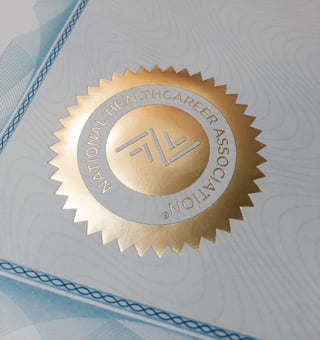 We're seeing more and more allied health professionals achieving stacked credentials — meaning they're getting more than one allied health certification.
We're seeing more and more allied health professionals achieving stacked credentials — meaning they're getting more than one allied health certification.
Why are they doing this?
Should you be stacking credentials?
What's the benefit to you?
Keep reading to discover why stacking credentials is a growing trend in allied health, and why maybe you should consider it, too.
Having more credentials shows employers you go the extra mile
Having more credentials doesn't just put more letters on your resume. It shows employers you have achieved a certain level of education/training in multiple areas, making you a valuable employee.
“Employers see credentialed candidates as more committed to their career and to excellence. It shows they are willing to go the extra mile and put forth more effort.” - Greg Stanfield, Executive Director/Dean of Education, Stevens-Henager College
Certain credentials make powerful combinations
NHA's certifications were designed to work together. Here are a couple of valuable combinations that can help you succeed.
Strong certification combination for the medical assistant
- Certified Clinical Medical Assistant (CCMA)
- Certified Phlebotomy Technician (CPT)
- Certified EKG Technician (CET)
Strong certification combination for the medical administrator
- Certified Billing and Coding Specialist (CBCS)
- Certified Medical Administrative Assistant (CMAA)
- Certified Electronic Health Record Specialist (CEHRS)
Even pharmacy technicians are seeing their roles evolve and expand. There may soon be opportunities to add credentials for those professionals who are already certified.
A.R. Johnson Health Science and Engineering Magnet — one of the highest-performing secondary schools in the state of Georgia — is one institution that encourages its students to secure stacked NHA credentials. They believe that students who graduate with multiple NHA allied health credentials will be better prepared for the competitive healthcare marketplace.
“ARJ’s curriculum and NHA certifications give students many choices and great opportunities for full-or part-time employment. We want them to do their best and pursue excellence. The NHA certifications help us measure and recognize them for excellent work.” - Lynne Clarke, former Department Chair, A.R. Johnson Health Science and Engineering Magnet
(Learn more about ARJ's allied health programs for high school students in this case study.)
Stacked credentials can help you climb up the career ladder
Stevens-Henager College is another institution that offers all NHA certifications (mentioned earlier in this post). The college's faculty and leadership has seen first-hand how former students who achieved stacked credentials have gone on to find greater career success.
"We've seen remarkable results. Our students are getting great jobs in the public and private sector, and the certifications are helping them earn promotions and raises." - Greg Stanfield, Executive Director/Dean of Education, Stevens-Henager College
(Learn more about how Stevens-Henager College sets students up for success through stacked credentials in this case study.)
As you can see, the right combination of certifications and credentials can help empower you to achieve your career goals and arm you for the competitive workforce. Securing stacked credentials is a trend for good reason, and it might be in your best interest to follow suit.
If you'd like to take the first step toward certification, or if you're an educator who'd like to offer NHA certifications at your educational institution, learn more in our guide.
